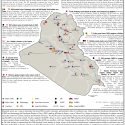 |
 |
Iraq Situation Report: March 1-20, 2017

By Emily Anagnostos, Jennifer Cafarella, and Jessa Rose Dury-Agri
Regional actors are vying to dominate the post-ISIS security structure and political order in northern Iraq. Turkey and the Kurdistan Democratic Party (KDP) are threatening the Kurdistan Worker’s Party (PKK) and its affiliates in Sinjar, west of Mosul City. Sinjar is a historic flashpoint for ethnic tensions and at the center of Turkish, Iranian, and Kurdish interests. The KDP seeks to incorporate Sinjar into the Kurdistan Regional Government (KRG), expanding the KRG’s territorial control. Turkey supports the KDP’s desire to move against the PKK and has threatened to participate in a direct attack. The desire to move against Sinjar could bring Turkey and the KDP into conflict with Iran. Iranian-backed elements of the Popular Mobilization are stationed nearby at Tel Afar and have claimed that the PKK-backed Yazidi militia in Sinjar is part of the Popular Mobilization. Iranian-backed militias could intervene on the side of the PKK in Sinjar if Turkey or the KDP act further, escalating the conflict which could undermine post-ISIS stability in northern Iraq. Russia is also seeking to gain influence in northern Iraq through a financial relationship with the KDP, which could embolden the KDP by granting it greater independence from Baghdad. Russian-owned oil company Rosneft renegotiated a loan with the KRG to pre-finance crude oil exports to Russia on February 21. Kurdistan Regional President Masoud Barzani later met with a senior Russian delegation in Arbil on March 1 to discuss strengthening bilateral relations between the KRG and Russia, marking the first high-level Russian delegation to visit Iraqi Kurdistan. Separately, tribal violence in southern Iraq, particularly in Maysan Province, signals rising intra-Shi’a competition ahead of provincial elections in September 2017.